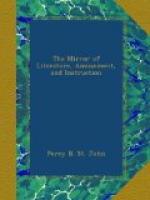It is difficult to judge when Lord Byron is serious or not. He has a habit of mystifying, that might impose upon many; but that can be detected by examining his physiognomy; for a sort of mock gravity, now and then broken by a malicious smile, betrays when he is speaking for effect, and not giving utterance to his real sentiments. If he sees that he is detected, he appears angry for a moment, and then laughingly admits, that it amuses him to hoax people, as he calls it, and that when each person, at some future day, will give their different statements of him, they will be so contradictory, that all will be doubted,—an idea that gratifies him exceedingly! The mobility of his nature is extraordinary, and makes him inconsistent in his actions as well as in his conversation.
Byron spoke to-day in terms of high commendation of Hope’s “Anastasius;” said that he wept bitterly over many pages of it, and for two reasons, first, that he had not written it, and secondly, that Hope had; for that it was necessary to like a man excessively to pardon his writing such a book—a book, as he said, excelling all recent productions, as much in wit and talent, as in true pathos. He added, that he would have given his two most approved poems to have been the author of “Anastasius.”
From “Anastasius” he wandered to the works of Mr. Galt, praised the “Annals of the Parish” very highly, as also “the Entail,” which we had lent him, and some scenes of which he said had affected him very much. “The characters in Mr. Galt’s novels have an identity,” added Byron, “that reminds me of Wilkie’s pictures.”
As a woman, I felt proud of the homage he paid to the genius of Mrs. Hemans, and as a passionate admirer of her poetry, I felt flattered, at finding that Lord Byron fully sympathized with my admiration. He has, or at least expresses a strong dislike to the Lake school of poets, never mentions them except in ridicule, and he and I nearly quarrelled to-day because I defended poor Keats.
On looking out from the balcony this morning, I observed Byron’s countenance change, and an expression of deep sadness steal over it. After a few minutes silence he pointed out to me a boat anchored to the right, as the one in which his friend Shelley went down, and he said the sight of it made him ill.—“You should have known Shelley (said Byron) to feel how much I must regret him. He was the most gentle, most amiable, and least worldly-minded person I ever met; full of delicacy, disinterested beyond all other men, and possessing a degree of genius, joined to a simplicity, as rare as it is admirable. He had formed to himself a beau ideal of all that is fine, high-minded, and noble, and he acted up to this ideal even to the very letter. He had a most brilliant imagination but a total want of worldly-wisdom. I have seen nothing like him, and never shall again, I am certain. I never can forget the night that his poor wife rushed into




